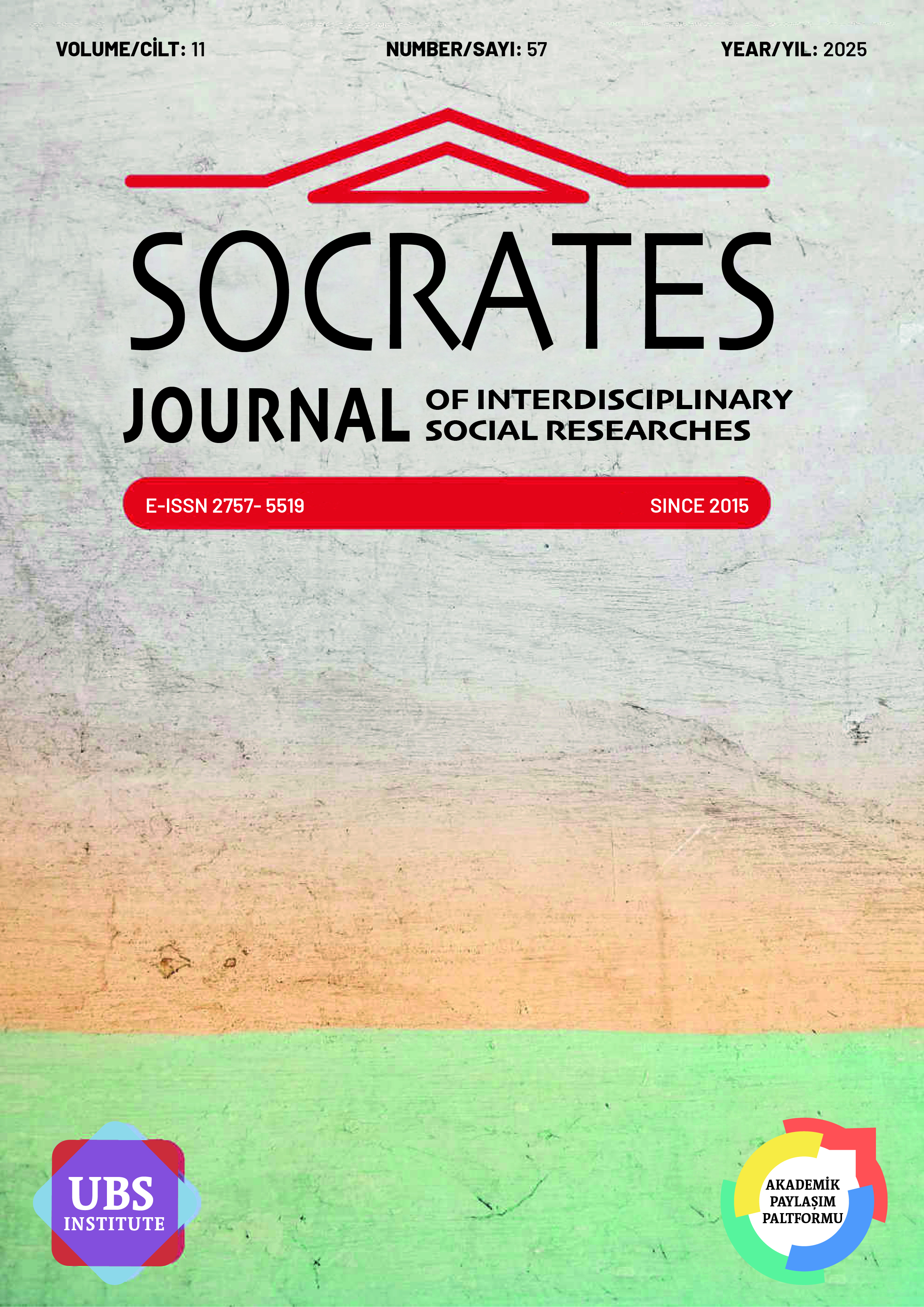ANALYSİS ON THE ROLE OF ALGORİTHMİC CULTURE İN EDUCATİON: THE DUOLİNGO CASE STUDY
EĞİTİMDE ALGORİTMİK KÜLTÜRÜN ROLÜ ÜZERİNE ANALİZ: DUOLİNGO ÖRNEĞİ
DOI:
https://doi.org/10.5281/zenodo.17218329Keywords:
Digital Transformation, Algorithmic Culture, Artificial Intelligence (AI), Educational Technologies, Duolingo, Personalized LearningAbstract
This study aims to examine the transformation of educational systems in the digital age within the context of algorithms and artificial intelligence (AI). It discusses the concept of “Algorithmic Culture” in education and explores how this culture shapes teaching and learning processes. The research investigates the social and cognitive impacts of algorithms on educators and students, specifically evaluating the potential opportunities and inherent risks introduced by AI applications through the case of Duolingo. The study employed a systematic document analysis method by reviewing relevant literature. Findings reveal that AI-supported educational applications provide significant benefits in terms of personalization, accessibility, and efficiency. However, they also possess debatable implications for pedagogical autonomy and raise ethical concerns that could overshadow the importance of human-centered education. In this context, the study aims to guide educators and policymakers seeking to develop a critical perspective in the digitalized world of education. Furthermore, it contributes uniquely to the literature by offering a concrete analysis through the Duolingo case study.
References
Namlı, N. A., & Şahin, M. C. (2017). Algoritma eğitiminin problem çözme becerisi üzerine etkisi. Recep Tayyip Erdoğan Üniversitesi Sosyal Bilimler Dergisi, 3(5), 135-153.
Bilgici, C. (2023). Yapay zekâ ve algoritmik kültür bağlamında sosyal medya deneyiminin geleceği üzerine bir değerlendirme. Yeni Medya Elektronik Dergisi, 7(3), 216-23
Bucher, T. (2018). If… then: Algorithmic power and politics. Oxford University Press.
Çöpgeven, N. S. ve Fırat, M. (2019). Uzaktan eğitimde algoritmalar: 2007-2019 sistematik alanyazın taraması. AUAd, 5(4), 65-91. 65
Figà Talamanca, G., & Arfini, S. (2022). Through the newsfeed glass: Rethinking filter bubbles and echo chambers. Philosophy & Technology, 35(1), 20.
Gawande, M. S., Zade, N., Kumar, P., Gundewar, S., Weerarathna, I. N., & Verma, P. (2025). The role of artificial intelligence in pandemic responses: from epidemiological modeling to vaccine development. Molecular Biomedicine, 6(1), 1-25. 10.1186/s43556-024-00238-3
Gillespie, T. (2014). The relevance of algorithms. In T. Gillespie, P. J. Boczkowski, & K. A. Foot (Eds.), Media technologies: Essays on communication, materiality, and society (pp. 167-194). MIT Press.
Google Share. (2025). Sosyal ve duygusal gelişim. https://share.google/3B06m0brpTFr5NeYk
Holmes, W., Bialik, M., & Fadel, C. (2019). Artificial intelligence in education: Promises and implications for teaching and learning. Center for Curriculum Redesign.
Karakoç Keskin, E. (2024). Dijital Medya Ortamında Rızanın Algoritmik İnşası: Eleştirel Algoritma Çalışmaları Perspektifinde Bir Tartışma. Yeni Medya, 16, 329-353. https://doi.org/10.55609/yenimedya.1424585
Kırdar, Y. ve Sönmezer, Z. (2025). Dezenformasyon Sürecinde Yapay Zekâ ve Bilim İletişimi. Gazetecilik ve Medya Çalışmaları Alanında Uluslararası Araştırmalar-IV kitabı, Eğitim Yayınevi, Ankara.
Kürkçüoğlu, H. (2024). Kültüre karşı yapay zekâ: posthümanizm, tekillik ve jetgiller yanılgısı. Motif Akademi Halkbilimi Dergisi, 17(48), 2082-2098. https://doi.org/10.12981/mahder.1556771
Kürkçüoğlu, H (2025). Algoritmalar ve Kültürel Üretim Yotube Öneri Sistemi Örneği, İstanbul: Alfa.
Livingstone, S. (2012). Critical reflections on the benefits of ICT in education. Oxford Review of Education, 38(1), 9-24.
Livingstone, S., & Helsper, E. J. (2007). Gradations in digital inclusion: Children, young people and the digital divide. New Media & Society, 9(4), 671–696.
Luckin, R., Holmes, W., Griffiths, M., & Forcier, L. B. (2016). Intelligence unleashed: An argument for AI in education. Pearson Education.
Lupton, D., & Williamson, B. (2017). The datafied child: The dataveillance of children and implications for their rights. New Media & Society, 19(5), 780-794.
Milli Eğitim Bakanlığı (MEB). (2023). Öğretmen El Kitabı. Yenilik ve Eğitim Teknolojileri Genel Müdürlüğü (YEGİTEK). https://yegitek.meb.gov.tr
Noble, S. U. (2018). Algorithms of oppression: How search engines reinforce racism. New York University Press.
OECD. (2021). AI and the future of skills: Capabilities and assessments. OECD Publishing.
Pariser, E. (2011). The filter bubble: What the Internet is hiding from you. Penguin Press.
Selwyn, N. (2016). Education and technology: Key issues and debates. Bloomsbury Publishing.
Selwyn, N. (2019). Should Robots Replace Teachers? AI and the Future of Education. Polity Press.
Sin, S. C. J., & Kim, K. S. (2013). International students' everyday life information seeking: The informational value of social networking sites. Library & Information Science Research, 35(2), 107-116.
Sleeman, D., & Brown, J. S. (1982). Intelligent tutoring systems. Academic Press.
UNESCO. (2021). AI and education: Guidance for policy-makers. United Nations Educational, Scientific and Cultural Organization.
Sönmezer, Z. (2025). Medya Nasıl Çalışır?, İstanbul: Der Yayınları
Uyak, S., Güngör Uyak, S., Ürey, D., Keskin, Ö., Aymaz, A. ve Aydın, İ. (2023). Okul öncesi eğitim kurumlarında yapay zekâ uygulamaları: yönetici ve öğretmen görüşleri. International Social Mentality and Researcher Thinkers Journal, 9(75): 4625- 4636. http://dx.doi.org/10.29228/smryj. 72414
Van Dijck, J. (2013). The culture of connectivity: A critical history of social media. Oxford University Press.
Van Dijck, J., & Poell, T. (2013). Understanding social media logic. Media and Communication, 1(1), 2-14.
Vygotsky, L. S. (1978). Mind in society: The development of higher psychological processes. Harvard University Press.
Zengin, F. (2021). Yapay Zekâ ve Kişiselleştirilmiş Seyir Kültürü: Netflix Örneği Üzerinden Sanat Eserinin Hiper Kişiselleştirilmesi. TRT Akademi, 6(13), 700-727. https://doi.org/10.37679/trta.959576
Williamson, B. (2017). Big Data in Education: The digital future of learning, policy and practice. Sage.
Witt, A., Ordonez, A., Martin, A., Vitiello, B., & Fegert, J. M. (2020). Child and adolescent mental health service provision and research during the COVID-19 pandemic: Challenges, opportunities, and a call for submissions. Child and Adolescent Psychiatry and Mental Health, 14(19), 1-5.
Woolf, B. P. (2021). Building intelligent interactive tutors: Student-centered strategies for revolutionizing e-learning. Morgan Kaufmann.
Downloads
Published
How to Cite
Issue
Section
License
Copyright (c) 2025 Socrates Journal of Interdisciplinary Social Studies

This work is licensed under a Creative Commons Attribution 4.0 International License.


